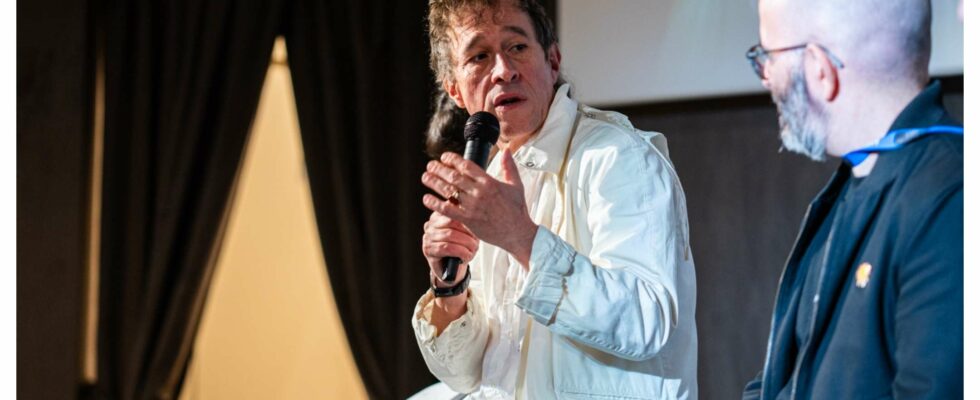Bertrand Bonello, réalisateur français, évoque son film « The Beast », projeté à Venise et lors de Lucca Comics, décrivant un Paris en 2044 où l’IA contrôle les émotions humaines. Il exprime des inquiétudes sur l’impact de l’IA sur la créativité, tout en réfléchissant à l’évolution du cinéma à l’ère des plateformes. Son film, mêlant genres, traite des traumatismes anciens. Bonello considère « The Beast » comme un tournant dans sa carrière, avec un nouveau projet en préparation pour l’année prochaine.
Bertrand Bonello, the renowned French director whose science-fiction film “The Beast” competed at last year’s Venice Film Festival, finds himself basking in the sun in the historic town of Lucca, dressed in white and contemplating the future. In a recent conversation, he shared insights with Variety about his experiences with the film, which premiered at Lucca Comics and Games, as well as his thoughts on the evolving landscape of cinema and artificial intelligence.
“The Beast” takes place in Paris in 2044, a world dominated by AI. In this tech-driven society, human emotions are viewed as a danger. To eliminate them, Gabrielle embarks on a journey to purge her DNA by revisiting her past incarnations. During this exploration, she reconnects with Louis, her great love, but is plagued by a sense of dread, fearing an impending disaster.
Lea Seydoux stars as Gabrielle, while George MacKay plays Louis. The film draws inspiration from Henry James’s novella “The Beast in the Jungle.”
What are your thoughts on AI?
“It’s quite unsettling. The power it holds is immense. Personally, I wouldn’t employ AI for creative decisions. For instance, I once asked AI to draft a script in my style, and it produced a four-page story in mere seconds. While its output isn’t great, it isn’t completely nonsensical either. Yet for actual film creation, it lacks coherence. That said, it might work for writing a specific episode of a series. This is the situation now; I wonder what it will be like in three or four years?”
The future is approaching.
Indeed, and it primarily revolves around financial considerations for actors, dubbing artists, and writers. The silver lining is that it compels creators to infuse more personal elements into their work since AI cannot replicate the deeply personal touch of human creativity.
“The Beast” addresses concerns regarding technology and its potential role in helping us confront our traumas.
Trauma is indeed a fitting term. In my script, I explore the concept of previous lives. While I don’t necessarily believe in them, I acknowledge the existence of deep-rooted and subconscious traumas. For example, Gabrielle in 2044 embodies all past versions of herself. This knowledge is clear to us, but not to her or Louis. So, how do we navigate these traumas? They are integral to our identity, shaping us, yet they also cause pain.
You have a history of blending genres. Given that “The Beast” fuses period drama, crime, and science fiction, do you see yourself continuing this path in future projects?
This film signifies a conclusion for me. It feels like a culmination of everything I’ve created thus far, and now I find myself needing to shift gears and explore new directions.
After creating so many films, this marks your final expression of trauma, so to speak.
I didn’t set out to achieve that consciously, but I came to this realization while promoting the film. Once a film is complete, it continues to resonate with you, offering new insights. Feedback from critics or audience members often highlights aspects I may not fully comprehend, revealing unconscious elements that are incredibly valuable. During interviews or film funding discussions, I am often asked ‘why’ about various choices. While I must provide explanations because that’s part of the process, they can sometimes feel contrived. I create the perception of control, yet some responses must accept, ‘I don’t know, but I sense it. It’s part of what remains unconscious.’
What’s your upcoming project?
It’s still in the early stages, but it will be very different from my previous works. The writing phase has wrapped up, and we’re about to begin casting. I plan to make an announcement once the casting is finalized, with hopes to commence filming next September.
How else is cinema evolving?
The landscape of cinema is undergoing a significant transformation. With the rise of streaming platforms and series, audience engagement has evolved. It’s crucial to adapt your writing and filmmaking to this new reality. One cannot simply dismiss the audience as unintelligent for preferring certain formats; the situation is far more complex. This change is both daunting and intriguing. You must integrate this evolution into your creative process; otherwise, you’ll fall behind. It’s about striking a balance between honoring the past and embracing the future. If you entirely embrace the future, you risk losing
